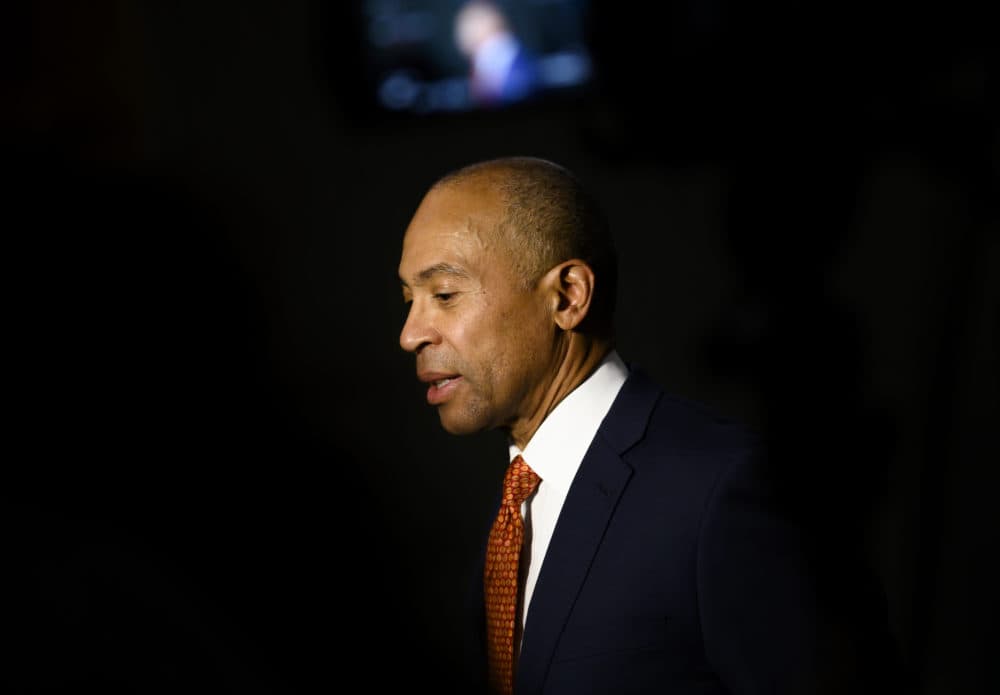Advertisement
Former Gov. Deval Patrick Says Chauvin Verdict Could Have 'Important Ripple Effect'
Resume
Former Minneapolis police officer Derek Chauvin was found guilty of murdering George Floyd, a Black man, in a closely watched trial that sparked reactions across the country, including here in Massachusetts
As Massachusetts activists and elected officials reacted to the verdict in the, former Massachusetts Gov. Deval Patrick joined WBUR's Morning Edition to share his take on the events — and what comes next.
Highlights from this interview have been lightly edited for clarity.
Interview Highlights
On the personal significance of the verdict for him
I was alone here in western Massachusetts. And I just welled up. I had this kind of looming anxiety about what the outcome would be — not because I didn't realize what I had seen and everyone had seen on that videotape. So it's not that the verdict was surprising, it's that I know what I saw on the Eric Garner videotape, and yet those officers were exonerated. I know what I saw on other videotapes and what I've read about other incidents and what I've heard from witnesses and what I've seen. And I know how often juries and prosecutors and others have found a way to excuse police excess. So it felt so relieving and so affirming to have this outcome. And I say that mindful that nobody celebrates any of this — or should. It just felt like it was a tiny but really, really important step in the right direction of actually valuing human life, even if that life is Black.
On whether his feelings of frustration as a Black man have changed since the verdict
I wouldn't say that we have reached the promised land on account of one outcome in one trial. This one was enormously important and and it's gotten so much attention over the last year or so that it will have, I think — and should have — an important ripple effect and point us in a direction around how we reexamine the expectations we have, all of us have, about police behavior and police conduct and accountability. So I'm not all the way there, but I do feel better ... I was holding this sense that no matter how well the evidence was coming in, that the jury might just — as they say in the law — nullify the evidence and and come down with a different verdict. They didn't. And that's incredibly important.
"[N]obody celebrates any of this — or should. It just felt like it was a tiny but really, really important step in the right direction of actually valuing human life, even if that life is Black."
Deval Patrick
On whether this will be a temporary inflection point or lead to lasting change
I think lasting change is up to us. I don't think any of this belongs on autopilot. I think this is a very important, positive milestone pointing toward the need for and the importance of change. But we still have important legislation stuck in the United States Senate in Washington. We have reforms that have been proposed in state legislatures and city councils, in police departments that have not moved to final resolution and haven't turned themselves into new rules. And we still have in many quarters ... a culture where we presume the worst of each other ... the worst cartoon version of each other. And we don't wait a bit, too, to ask ourselves, what is this individual about? And that's true in the criminal justice system. It's true in employment and housing and and frankly, in a lot of our personal interactions with each other as neighbors and fellow citizens. And that that's what I mean when I say whether lasting change comes is up to all of us. And we all have to take some responsibility for that.
On how to harness the energy of this moment for positive change
Well, I think that a lot of the honor and credit goes to the folks who've been organizing in the neighborhoods and at the grassroots, and they've been doing it across all kinds of differences — economic and racial and social. And I think that is enormously important that it has happened and it's also enormously important that it's been sustained. ... We have a famously short attention span in this country. And we kind of leap from one outrage to the next. The fact that folks have stayed focused on the importance of reforming police culture and the importance of racial justice generally is, to me, very, very hopeful. So I think we have to stick to that. And I think that means a whole bunch of uncomfortable conversations. I think it means a lot of hearing things we may not want to hear. And I think that that means all of us have to be willing to hear each other and to take that in, provided that we're able to come to the table respectfully and with the idea of actually coming to a practical and better solutions on the other end.
This article was originally published on April 21, 2021.
This segment aired on April 21, 2021.

